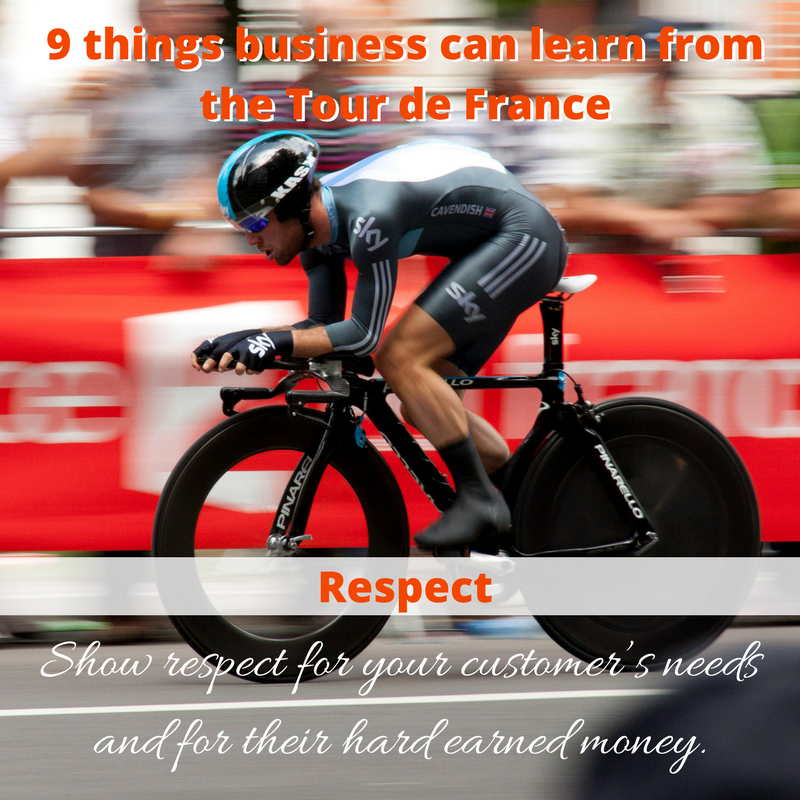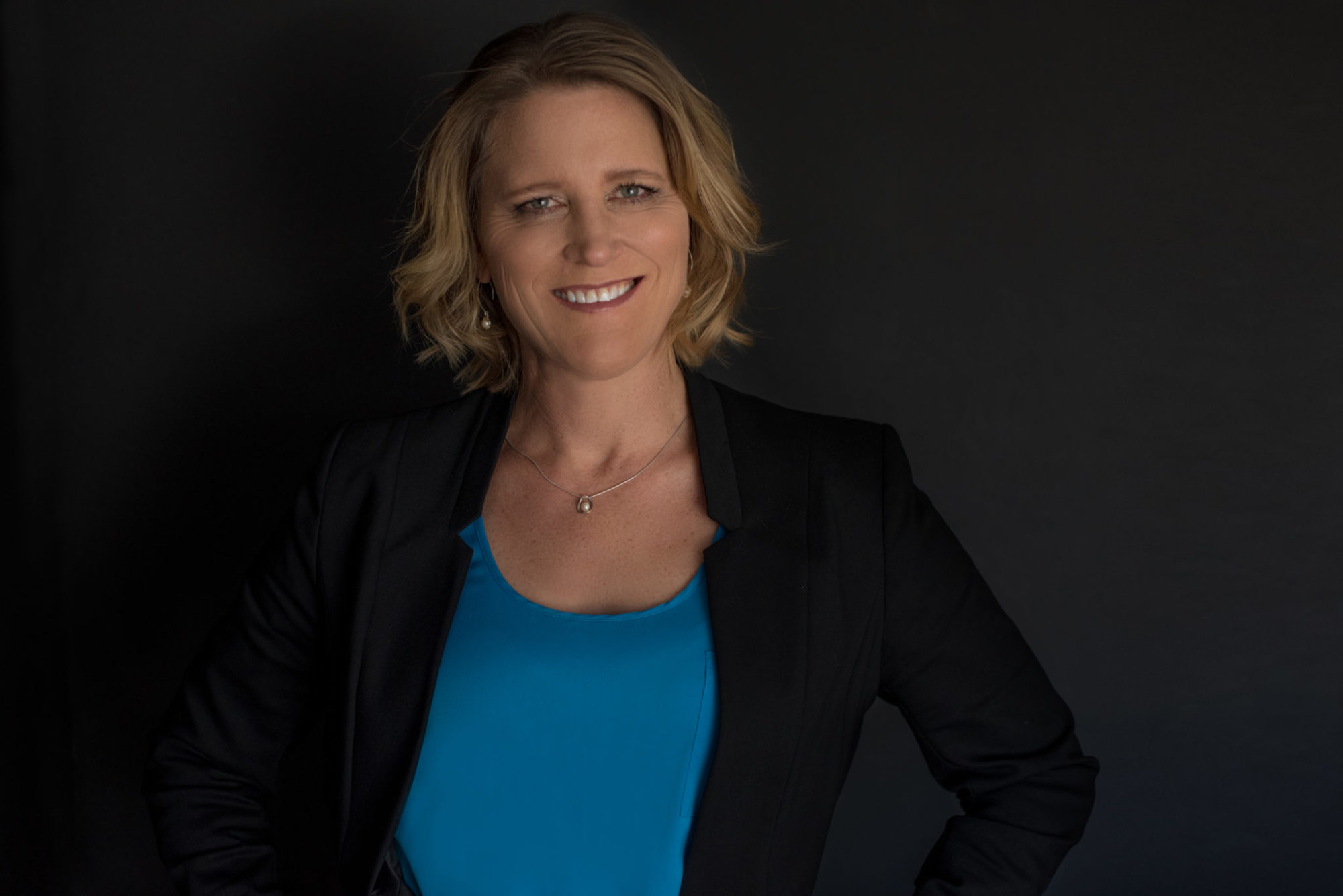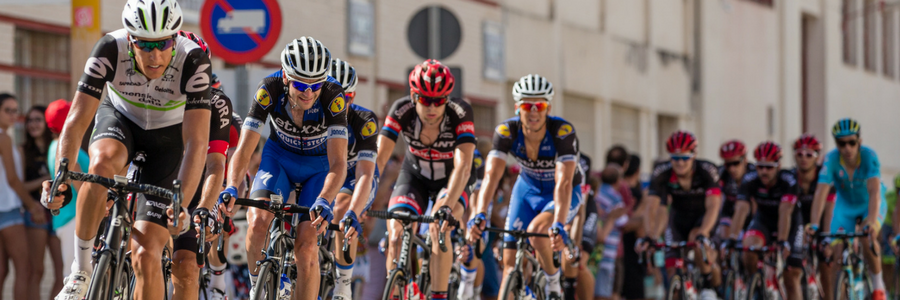Lessons for business
Tour de France 2017 started last weekend and it’s one of my favourite three weeks of the year. It’s on the top of my bucket list to take a trip to follow the Tour one day and soak up the atmosphere, the achievements and the excellence. When I watch the Tour, I recognise there are many lessons for business which can be learnt from the athletes.
The Tour de France is arguably the toughest human physical challenge on Earth. The riders who line up to start the Tour are physically and mentally superior to most elite athletes. The riders who manage to finish the 2200 miles or 3520 kilometres, are almost super human.
There are many lessons for business which can be learnt from the Tour de France. Share on X
Five time winner Bernard Hinault of France once said of the Tour de France, “an amateur should think long and hard before attempting one of these stages. Two would probably necessitate a visit to a doctor and three would require a psychiatrist – any more and you should be checking if that person has written a will.”
Clearly it’s a tough challenge, even for the best.
The Tour de France consists of not three but 21 stages contested over 23 days. On average, each stage is around 95 – 150 miles or approximately 150 – 200 kilometres each. While the average person burns around 2000 to 2500 calories per day, Tour de France riders require up to 5000 calories per day to fuel their enormous efforts.
Learning from the best of the best
Three time Tour de France Green Jersey winner, now commentator, Australian Robbie McEwan uses words like excruciating and agonising to describe what the riders endure each day.
There is no doubt, the extraordinary athletes of the Tour de France are the best of the best. The qualities they possess and the attributes they display to compete at the highest level are what make the Tour the spectacle it is.
Anyone striving to be a top performer in any discipline, including business, can take many lessons from the Tour de France.
Here are nine things I believe business can learn from the great race:
Excellence
To perform at the elite level, in any discipline, you have to do things above and beyond the rest. Elite athletes are the epitome of excellence. They do the work, others aren’t willing to do. They apply excellence to every aspect of their craft. Elite athletes breath excellence, sleep it, walk it, talk it, eat it and think it. Performing at the highest level requires attention to detail that most people aren’t willing to apply.
High performance, whether it be in sport or business requires excellence. It requires a consistent commitment to be the very best you can be. This means not once, but every day, in every task and with every interaction.
Performing at the highest level requires attention to detail that most people aren't willing to apply. Share on X
Striving for excellence doesn’t mean you won’t make mistakes. Excellence is vastly different to perfection. Excellence means you are willing to give your all, take advice and learn from mistakes.
The best thing is, it doesn’t require talent to demonstrate excellence, it only requires effort.
Excellence means you are willing to give your all, take advice and learn from mistakes. Share on X

Commitment
Expertise in any field takes incredible commitment. In his 2008 book, Outliers, psychologist Malcolm Gladwell, famously concluded it takes at least 10,000 hours of practice to master a skill.
Elite athletes aren’t born with incredible skill. They get there through commitment and years of deliberate practice. Yes there are other factors, including genetics, which separate the best athletes in the world from the mediocre. But there is no doubting the commitment of those who ride the Tour de France, or compete at the highest level in any sport.
While there is no guarantee of success in sport, or in business, it would be an impossible task to find a successful business or a successful entrepreneur who has not shown commitment to their field.
You are never going to accidentally stumble on success in business. Without a doubt, a very high level of commitment is a necessity.
You are never going to accidentally stumble on success in business. Share on X
Sacrifice
Let’s be honest. Being a Tour de France rider, requires sacrifice on a level us mere mortals couldn’t even fathom. The intense fatigue, pain and dedication of the physical training. The dietary control to be as lean and light as possible while still maintaining peak physical performance. Risking potentially life threatening falls and high speed crashes while traveling as fast as a car on roads, with little more to protect your body than a thin piece of lycra.
To be the best of the best, whether it be in sport or business, you’ll need to make sacrifices. Achieving at a high level is hard work. It won’t be easy, but it will be worth it!
Teamwork
Believe it or not, professional cycling is a team sport. Teams of nine men ride so that one rider can win. The general classification contender is the only rider aiming for a place on the podium at the end of the race. The job of all the other riders on the team is to give all they have and push to the point of exhaustion to protect and support the team leader towards glory.
Just like in business, each rider on the team has a specific job. There are the climbers who are aiming for the glory of the Polka dot Jersey and title of King of Mountains. There are also climbers given the task to pull the team leader through the Pyrenees and the Alps. There’s the lead out men who work together to help the sprinters to victory and hopefully the Green Jersey. There’s the domestiques who’s job it is, to work to physical exhaustion, to protect the team leader from the wind, from crashes and to help conserve their leader’s energy so they can perform at their peak for the full 21 stages.
It’s rare to find teamwork as tactical and selfless as demonstrated in the Tour de France.

Acknowledgment is critical
When you see a Tour de France rider win a stage, he never fails to thank and recognise his team mates for their hard work and sacrifice. Here is an example — 2017 Stage 6 winner Marcel Kittel from Germany, responding in his post race interview:
Interviewer – “Another victory for you. Can you take us through those final moments?”
Marcel Kittel – “First of all I want to say that I’m very proud of my team. They did a great job. We could really bring ourselves into the front in the key moment, to keep me there.”
Business can learn a great deal from this.
Great teamwork in the workplace must start with strong leadership. Behind every successful business leader, are dozens or even hundreds of staff doing great work. Being a leader means recognising and valuing the contribution of each and every member of your team. Leadership means fostering great teamwork. Without it, there is no success.
Just as the Tour de France riders know the importance of great teamwork, business leaders must as well.
Resilience
Resilience is the capacity to recover quickly from difficulties and there is no better example of resilience than at the Tour de France. The physical and mental demands the riders are subjected to on each day’s stage would be enough to sideline most well trained athletes.
Falls, crashes and injuries are common. The Tour de France riders must put in a peak effort each day, and then have the ability to bounce back the next day, ready to tackle another leg breaking challenge with just as much gusto as the previous day.
In business, there are many things which might knock you down. Seasonal peaks and troughs, customer complaints to cash flow challenges. Running a business is often described as like riding a roller coaster. From one day to the next, there can be incredible highs and soul destroying lows. To succeed in business, you must have incredible resilience to be able to handle challenges, deal with problems, dust yourself off, pick yourself up and get back on track the very next day.
Durability
According to Derrick McManus, Founder of the Australian Centre for Human Durability, peak performance demands durability. Durability is sometimes confused with resilience, but in fact it’s quite different. Derrick explains, “durability is the ability to sustain optimum performance, even under pressure.”
Not only do the Tour de France riders have to bounce back from one day to the next, they have to perform at the highest level for three weeks in a row (they only get two days off over the entire Tour). And that’s just one race in the pro season.
The racing season for professional cyclists lasts nine months. They need to be striving for optimal performance for three quarters of the year. That’s some amazing durability!
Diamonds under pressure
Professional cyclists are under extreme pressure, physically and mentally. They have pressure from their team mates, their team bosses and their sponsors. Yet despite the demands, they display incredible durability, performing at the highest level, for months and years on end.
Running your business may not have the physical demands of elite sport, but in some ways, business has just as much pressure. There is rarely an off-season in business. You have to be able to work hard and perform at your best all year round.
As a business owner, having good durability helps you maintain a consistent, profitable business, month after month and year after year. Derrick applies durability to business by explaining leaders with good durability “have such a good knowledge of why the problems have occurred in the past, they are able to visualise what problems may occur in the future. They are able to visualise problems in the future and have the answers already. These are the people who seem to be stress free in the midst of a crisis.”
Remaining stress free in times of crisis while still creating success is something all business owners can aspire to!
Respect
One thing I love about the Tour de France is the respect shown by riders to each other and to the institution of the event itself. I believe businesses, business owners and people in general can learn a lot from this old school attitude.
On the Tour, if there is a major event disrupting the fairness of the competition (such as a crash, major accident or injury), the peloton will often ease off their pace to allow a fair and true competition to resume.
Showing respect for your competitors, your colleagues and your customers is always the right thing to do. Show respect for your customer’s needs and for their hard earned money. Understand that customers deserve to spend their money in the way which suits them best. Most importantly they deserve to find the best solution to their need, even if it’s not from your business.

Relevance
Yesterday’s efforts in the Tour de France mean little today. Every day is a new challenge requiring the same if not more effort. At the end of each day’s stage in the Tour, the winner of the day stands in triumph on the top tier of the dias. Their team, their sponsors and the fans, celebrate the victory and the rider becomes a household name around the world in that moment.
When the next day dawns, there are no favours reserved for yesterday’s winner. There is no advantage, no accolades and at the end of the following day’s stage, just 24 hours later, a new stage winner is crowned.
It’s all about relevance. You can’t ride yesterday’s coat tails in business either. What you did yesterday, means nothing today. In business, you have to keep turning up and giving everything you’ve got, every single day. There will not be accolades today, for yesterday’s efforts. Tomorrow there could just as easily be a new competitor, a better value service or a shinier product which will steal the limelight away.
You need to tell your customers you exist, every day you want to be successful. Your business must look after your customers, just as well today as it did yesterday. As a business owner, you can never rest on your laurels and never assume you can rely on yesterday’s reputation for your future success.
Competition
There can only be one winner. Like it or not, just like the Tour de France, business is about competition and there can only be one winner. Every transaction in business represents a battle. Unlike the Tour though, there are hundreds of thousands of battles being fought each and every day.
Every day, as a business owner, you’re competing against direct competitors for sales and indirect competitors for customers. You’re competing against social media posts, tweets and hashtags for attention. There’s the relentless battle against the household budget and established loyalty to other brands.
The scale of the competition varies from day to day, from product to product, from industry to industry. The bottom line is, each customer’s transaction represents a competition with a winner. Whichever business does the best job, looks after the customer and demonstrates excellence, wins the battle.




I can only say, wow, wow, wow, i loved to read it, Super Super done.
Keep your work up, will share with my friends
thank you
Dieter
Thankyou! Much appreciated.
Love the connection made to business! Having just graduated with my undergrad degree in business, I definitely see the link 🙂 Well written!
Thanks Julia! Congratulations on your graduation. Great work!
An excellent set of points that you have made here – particularly pertinent for me is the section on ‘relevance’. This is simply about NOT being conservative in business and being a leader. Well articulated.
Thank you so much for your insights Robert. Yes these points are all very relevant to leaders creating positive and inspiring environments.
I love your thoughtful post. While I agree with your points, excellence is something you can strive for, as long as it does not stop you from acting. Commitment, resilience, teamwork….. all great points.
Oh I totally agree Rosalie, everyone can strive for excellence but it should be a journey, not a destination. Thank you so much for your comments.
Each and every word is so truely written. According to me the commitment part is the most important and hard to follow in any business. It requires time and patience. And the famous lines Malcolm Gladwell, that it takes at least 10,000 hours of practice to master a skill is the best advice for a successful business.
Time and patience are definitely key things for anyone in business, I agree Nancy!
Really enjoyed reading this and the correlation between the race and business is well laid out. I agree with many of your points and when I read the Relevance section, I was thinking how wonderful it is that a new day is our new chance to get it right! If something we tried yesterday didn’t work out or go as planned, move on and strive for excellence again today!
Good comparison and very valid and true. Good sports people are after their sports career also good business guys. Teamwork is my personal number 1
Thanks Dieter! Teamwork is very important 🙂